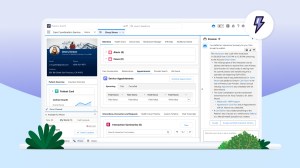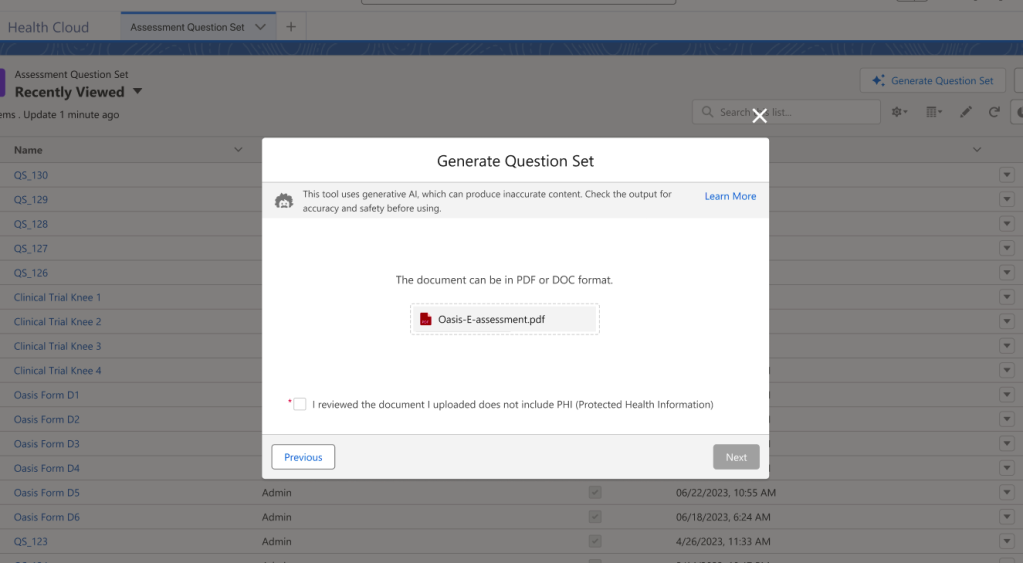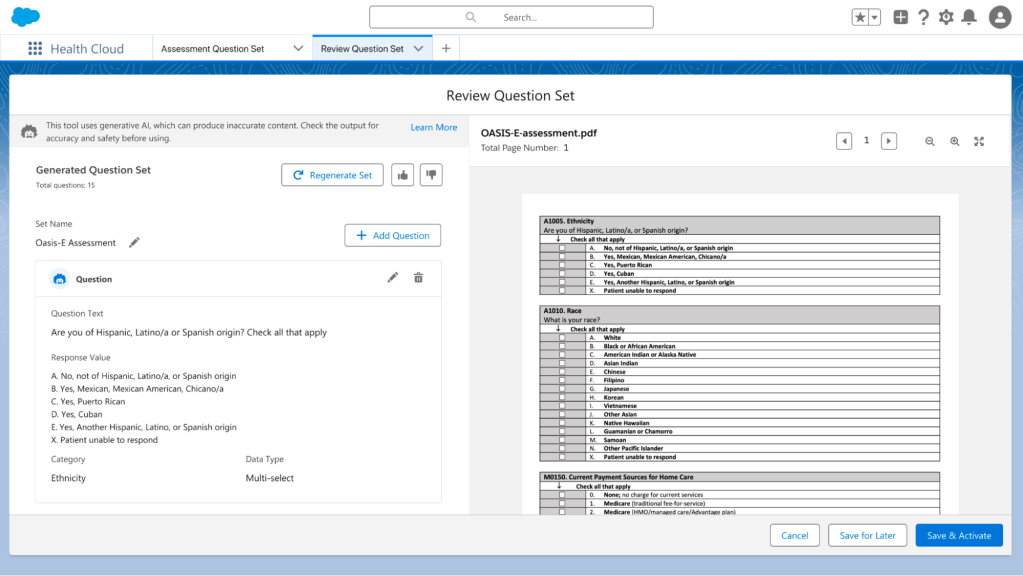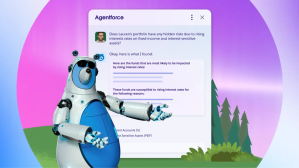Salesforce’s Einstein 1 Platform powers Einstein Copilot with your healthcare organization’s unique data and metadata from Data Cloud to capture and summarize patient details, quickly update patient and member information, and automate manual processes
Assessment Generation digitizes paper assessments and surveys to capture and track patient data
Customers like Baptist Health South Florida and HarmonyCares are using Salesforce to personalize patient interactions and create a single, unified view of each patient
Today, Salesforce announced AI and data innovations for CRM to help make healthcare operations more efficient and personalized. Einstein Copilot: Health Actions, a conversational AI assistant that will deliver trusted AI responses grounded with your healthcare organization’s own trusted and private data, Assessment Generation, and Data Cloud for Health help automate and streamline clinical summaries, deliver more personalized communication, and help compile tailored patient assessments faster for care teams, all from a single platform.
These new innovations are powered by Salesforce’s Einstein 1 Platform, which helps organizations safely unlock their data to create better patient experiences and augment employee productivity.
Why it matters: Nearly a quarter of U.S. healthcare spending is wasted on administrative costs, presenting a potential cost savings of up to $320 billion for healthcare organizations, according to McKinsey and Co. AI could be the solution, with recent Forrester data revealing that 82% of healthcare data leaders say AI is a top focus area that will drive operational efficiency.
The patient perspective: Patients are also open to AI innovation. A recent Salesforce survey found that more than half of U.S. adults are comfortable with the use of AI across nonclinical use cases, such as scheduling appointments and estimating medical expenses. This showcases an opportunity for healthcare organizations to use AI in handling administrative and operational tasks while freeing up providers to spend more time with patients.
Innovation in action: Salesforce is boosting the efficiency of care teams, service agents, and system administrators with features to help them automate manual tasks like answering questions around benefits coverage and deductibles, segment at-risk populations for targeted outreach and care, and digitize assessments to streamline and improve the patient experience.
- Einstein Copilot: Health Actions will use conversational AI to trigger workflows that send referrals, book appointments, revise care plans, and more. With Health Actions, qualified healthcare professionals can use natural language prompts to capture and summarize patient or partner details from different clinical and non-clinical sources, easily update patient and member information, and automate outreach. For example, a provider can use Einstein Copilot to create a patient summary, including medications, diagnoses, social determinants, assessments, clinical service requests, and care gaps. A care manager can also ask Einstein Copilot to help find an in-network provider for their patient based on preferred location, specialty, and plan coverage, and then auto-populate an electronic referral form using natural language prompts, embedded within the flow of their work.
Einstein Copilot can generate interaction summaries for the care coordinator, which can be sent to the patient as well as any new primary care provider, and are easily added to records in the system. The call summary includes all details of the interaction as well as clearly-articulated next steps for the patient.
- Assessment Generation will let healthcare organizations digitize standardized health assessments and automatically upload the information directly into Salesforce Health Cloud. For example, an administrator can easily upload a form like an OASIS-E survey and digitize the questions to be populated electronically by patients and tracked for progress to understand if there have been any major patient changes or improvements. This quickly transforms a source PDF into actionable digital fields while lowering the risk for errors. Now, instead of an administrator manually typing and coding every assessment question one by one, generative AI automates the process for them, helping to reduce the time it takes to complete this task from days to minutes.
Assessment Generation allows payers and providers to digitize standardized assessments and automatically input questions into the system. These can then be filled out electronically and tracked for progress.
High-quality AI requires high-quality data and insights: All of these data and AI features are built on Salesforce’s Einstein 1 Platform, which is powered by Data Cloud, and give healthcare organizations the information they need to create a single view of each patient and surface the right insights:
- With Data Cloud for Health and MuleSoft Direct for Health Cloud, healthcare organizations can bring data from different sources — including electronic health records (EHRs), claim systems, and health applications — into a common healthcare data model to build unified patient profiles and personalize interactions. And, Salesforce’s new Vector Database helps manage and ingest both structured and unstructured data, leading to better generative AI output. Now, for example, a healthcare system can ingest and harmonize behavioral, clinical, and social information across its member base to identify middle-aged males with diabetes and then generate a customized campaign to help them manage glucose levels.
- With Tableau Pulse for Health, healthcare organizations can use generative AI to surface insights in plain language, providing access to metrics and predictions that help teams make better decisions. For example, a clinician or care manager can easily visualize patient stats around readmission rates, length of stay, or care plan adherence. Grounded in the Einstein Trust Layer, Tableau Pulse also supports security and reliability of data in a healthcare setting.
Healthcare organizations can run Tableau Pulse on Data Cloud for Health to explore their data and drive action from real-time insights. Tableau Pulse empowers every healthcare employee with intelligent, personalized insights delivered right in workflows like email and Slack.
Salesforce perspective: “These new data, AI, and CRM features help reduce the administrative and operational burden for healthcare providers and care teams, leading to better outcomes for their patients. And with Salesforce’s trusted AI, healthcare organizations excited about generative AI — but nervous about clinical and security concerns — can confidently use these innovations in their everyday workflows.” – Amit Khanna, SVP & GM for Health
These new data, AI, and CRM features help reduce the administrative and operational burden for healthcare providers and care teams, leading to better outcomes for their patients.
Amit Khanna, SVP & GM for Health
Customer perspective:
- “We’re able to serve over 1.8 million loyal patients with Salesforce’s Einstein 1 platform, leveraging the power of Data Cloud, Health Cloud, and intelligence throughout. Thanks to seamless integration with EMRs and other external data, we’re able to form a single source of truth and generate personalized communications at the right time to grow and cultivate relationships with our patients.” – Val Lopez, AVP Marketing Operations, Baptist Health South Florida
- “At HarmonyCares, we understand that the care we provide to each patient must be personalized. Salesforce helps us approach patient engagement and the management of the care journey in a way that enables us to optimize every touchpoint with our patients.” – Kristin Darby, Chief Information Officer, HarmonyCares
Availability:
- Data Cloud for Health and Tableau Pulse are generally available today.
- Assessment Generation will be generally available beginning in summer 2024.
- Einstein Copilot is expected to be HIPAA-compliant by summer 2024. Copilot: Health Actions will be generally available in winter 2024.
Pricing:
- Access to Data Cloud credits, Einstein AI requests, Copilot, and more is included with Health Cloud – Einstein 1 for Service and Sales Editions. Assessment Generation will be available through the suite in summer 2024.
- MuleSoft Direct for Health Cloud is available as an add-on to all Health Cloud editions.
- Tableau Pulse is free with all Tableau Cloud editions and Embedded Analytics solutions. Existing Tableau Cloud or Embedded Analytics customers can simply go into settings and turn on Pulse, and then turn on the Insights Summaries within Pulse to enable generative AI functionality.
Learn more:
- Learn about Health Cloud – Einstein 1 for Service and Sales Editions and how to get started with trusted Einstein Copilot: Health Actions, Assessment Generation, Data Cloud for Health, and Health Intelligence, including CRM Analytics and Revenue Intelligence, all in one bundle.
- Find out how HarmonyCares is scaling patient scheduling and home health with Salesforce’s Einstein 1 Platform
- Discover insights about healthcare consumer preferences and the role of AI in care from “The Pulse of the Patient Snapshot” survey results
- Watch how Salesforce helps healthcare organizations build unified patient profiles
- Learn how 500 industry healthcare leaders are leveraging the power of AI to deliver equitable care, automate operations, and engage stakeholders
- Learn about Salesforce for Healthcare and Life Sciences

















